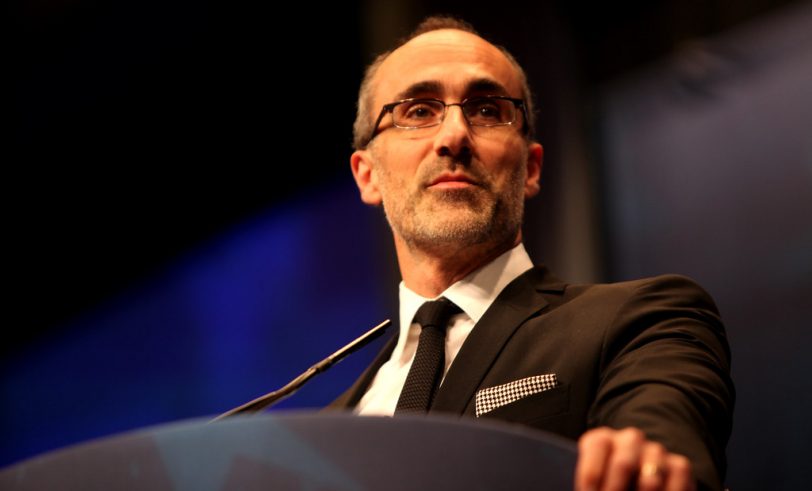Movie Review: The Pursuit

Gage Skidmore/Creative Commons 2.0
If you’ve never watched Milton Friedman’s 1979 appearance on the Phil Donahue show, go watch it now. It is required viewing for anyone who is interested in free-market ideas and hopes to understand them. Better yet, let’s just say it is required for everyone. Friedman is lauded as one of the greatest champions of the free-enterprise system of all time. On Donahue, he was discussing his book, Free to Choose: A Personal Statement, which he co-wrote with his wife, Rose Friedman. He later released a 10-part television series with the same title.
In one of the more memorable exchanges of the interview, Donahue asks Friedman a question many are still asking today:
When you see around the globe, the maldistribution of wealth, the desperate plight of millions of people in underdeveloped countries. When you see so few “haves” and so many “have-nots.” When you see the greed and the concentration of power. Did you ever have a moment of doubt about capitalism and whether greed is a good idea to run on?
Friedman’s reply has become standard among capitalists like me. “Is there some society you know that doesn’t run on greed?”
Friedman continued:
You think China doesn’t run on greed? What is greed? Of course, none of us are greedy, it’s only the other fellow who is greedy. The world runs on individuals pursuing their separate interests.
The great achievements of civilization have not come from government bureaus. Einstein didn’t construct his theory under order from a bureaucrat. Henry Ford didn’t revolutionize the automobile industry that way.
In the only cases in which the masses have escaped from the kind of grinding poverty you’re talking about, the only cases in recorded history, are where they have had capitalism and largely free trade.
If you want to know where the masses are worst off, it’s exactly in the kinds of societies that depart from that. So that the record of history is absolutely crystal clear that there is no alternative way so far discovered of improving the lot of the ordinary people that can hold a candle to the productive activities that are unleashed by a free enterprise system.
In the years since the Donahue interview, the free enterprise system has continued to improve the lot of ordinary people. Yet today, possibly more than in Friedman’s day, Americans are showing support for socialist policies. Shockingly, a 2019 Gallup poll found that four out of ten Americans supported some form of socialism.
What happened? How can socialism be gaining popularity even as confidence in capitalism wanes? The problem is that a defense of capitalism like Friedman’s satisfies the head but not the heart. When people—especially young people—look around the world today, many of them see it as Donahue described it. As a result, they question the morality of capitalism.
Enter Arthur Brooks.
Brooks is the past president of the American Enterprise Institute, a social scientist, a former university professor, and a former professional French horn player. Yes, you read that right. Brooks has written best-selling books such as The Conservative Heart: How to Build a Fairer, Happier, and More Prosperous America and Love Your Enemies: How Decent People Can Save America from the Culture of Contempt.
Recently, Brooks released a documentary, The Pursuit, which is now available on Netflix.
In it, he asks, “From 1970 until today, the percentage of the world’s population living at starvation’s door has decreased by 80 percent. Two billion people have been pulled out of starvation level poverty. What did that?”
His answer is the same as Friedman’s—free enterprise. Indeed, the messages of Free to Choose and The Pursuit are essentially the same: No other system has succeeded like free enterprise in allowing people to direct their own destiny and pull themselves out of poverty.
The key difference between the two is that when Brooks discusses how to help the most disadvantaged, it’s clear that he’s making not just an intellectual argument but also an emotional appeal. He cares about human flourishing. From the very beginning, he frames the argument for capitalism as a moral one, saying “the point of the American experience is basically a moral consensus that our society should push opportunity to the people who need it most. This is our pursuit, and it’s predicated on two fundamental moral principles: human dignity and human potential.” Brooks shows us this as he walks the streets of India, once a scene of abject poverty during the days of democratic socialism. Now, after free enterprise has been released, we see progress. Hindol Sengupta, editor-at-large of Fortune India, says it like this, “Capitalism allows human beings to choose an action to fulfill their own destiny. . . . Forget per-capita GDP—we didn’t even have per-capita hope.”
None of this is to say Friedman did not care about the poor, but his arguments can come across as those of an academic. They are for the head. Through The Pursuit, Brooks provides the answer for the heart.
Add The Pursuit to your list of required viewing. Go watch it . . . after you watch the Friedman interview.

